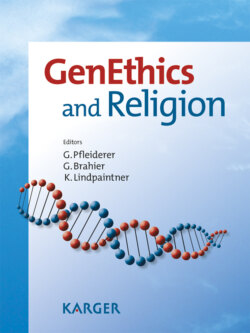Читать книгу GenEthics and Religion - Группа авторов - Страница 23
На сайте Литреса книга снята с продажи.
We Do Our Genes
ОглавлениеIt is easy to see that genome interpretations do have ethical implications. Space allows me only to mention some. Consider pre-symptomatic genetic tests. Within the framework of program genomics, a mutation in a cancer-related gene is understood as information that the body carries and that instructs the cells to make tumors, or, in the case of mutated tumor suppressor genes, as a ‘fault’ in the information that tells the body how to suppress tumor cells that might emerge. In the framework of systems genomics it looks different. The same mutation in a cancer-related gene is an indicator for an elevated likelihood that the body under certain circumstances can get cancer, or an indicator that the body's capacities to prevent cancer are weakened. Within this interpretation, the mutation does not indicate ‘information for making cancer’ or a ‘fault in the information on how to suppress cancer’. There is no information ‘for cancer’ in the body right now. The patient does not walk away with the idea that ‘I have a fault in me’, but knows about a risky, even dangerous condition and hopefully about possible precautions to take.5 The practical measures that are recommendable will not be different, but the relationship of the patient to his or her body will be different. This has implications for the language used in genetic counseling, and also for the ideas of what ‘good counseling’ means.
Or consider embryo ethics. One argument that plays a crucial role in the politics and ethics of embryo research (stem cells, cloning, etc.) is potentiality [33]. Many bioethicists who defend this argument base it on the genome. The embryo, after fusion of the egg and sperm, carries the full genome for the individual. Alfonso Gómez-Lobo [34] writes:
‘The potentiality to become a male or female human adult is due to the biological program contained in the genome’.
And therefore, he argues, it is not the gametes that are entitled to moral and legal protection but the embryo and the fetus, right from its beginning. Or read Otfried Höffe who argues in a similar way:
‘Was Kritiker als “blossen Zellhaufen” abtun wollen, trägt von Anfang an, als befruchtete Eizelle mit doppeltem Chromosomensatz, das volle genetische Programm für die Entwicklung eines Menschen in sich. Das Programm liegt tatsächlich rundum vor, in seiner notwendigen und zureichenden Gestalt’ [35, p 137].6
In the framework of systems, obviously, this argument does not work. To recognize this not necessarily changes our ethical attitudes of care and parental responsibility, which we owe to embryos. It will not make them freely accessible for research, because there are other grounds for responsibility as well. But nevertheless, it will change the reasons why philosophers can defend a responsible legal framework for embryo research. And other positions might be less dogmatic and allow more freedom for individual ethical judgment.7
Bioethics, I want to conclude, needs a contextual hermeneutics of the body, of genes, of cellular systems, and of nature, which is methodically and topically not separate from the hermeneutics of traditions, art, discourses and morality. This bioethics that society needs cannot be a shallow kind of ‘applied ethics’ where a certain moral dogma is taken for granted and ‘applied’ to a practical dilemma. Society needs a bioethics that is part of broad practical philosophy and works closely with the social sciences and humanities. Philosophy needs to go into the world and to work in interdisciplinary collaborations with social and cultural studies. It also needs to learn from people out there in the situations, who live those new kinds of dilemmas, who feel where and how moral questions arise. In the practical circumstances surrounding biotechnologies or biomedicine, the deepest questions about what is ‘good’, what is our desire for ‘a good and fulfilled life with others and for the others’ in a social and natural environment arise. Questions about what are ‘just institutions’, and what is ‘ethical governance’ in bio-societies arise. Bioethics therefore also needs a strong theoretical component reflecting independently the needs of society with regard to the conceptual tools and methods used. In this respect, biosciences are a fruitful soil on which ethics can grow.
